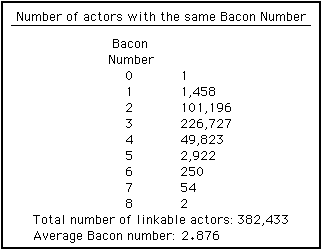

A surprise property of the connected world
Many commentators enthuse about the potential of the Internet, proclaiming that it will revolution's the way we do business and the way we shall lead our lives, but, few give any plausible explanations as to why this should be. This is because the world of the Internet contains a surprise that is counter intuitive: the phenomena of small world clusters. To understand this serendipitous property of the connected world, let's look at another game: the Kevin Baker game.
The Kevin Bacon game
Imagining a community of film makers is relatively easy. More difficult is the trick of abstracting the essence of the communication infrastructure that links all the various people in this community together.
Fortunately though, there is a simple model we can use that comes from the film community itself: the Kevin Bacon game.
This game originated as a play (and film) written by John Guare in 1993 called "Six Degrees of Separation". The intriguing hypothesis put forward by John Guare in this play was that everyone in the world is separated from each other by no more than six communication links.
In a state of inebriation, three students, Craig Fass, Brian Turtle, and Mike Ginelli, from Albright College, came up with the idea that every actor, living or dead, could be linked through their appearances in films to an actor called Kevin Bacon – and by no more than six films. This idea quickly spread through college campuses, via the Internet, resulting in Fass, Turtle, and Ginelli appearing on a television show and then writing a book about the game, which was entitled "Six Degrees of Kevin Bacon" (1994).
The idea captured the imagination of thousands of different people. It became a popular game at Hollywood parties, where actors and actresses would work out their personal Bacon numbers based upon the number of connection links they had to Kevin Bacon through their own appearances in films. It wasn't long before the Internet Movie Database (http://us.imdb.com) was being used to work out Bacon numbers. The University of Virginia set up a Web site (http://www.cs.virginia.edu/oracle/), known as "The Oracle", where anyone could enter any actor's or actress's name to find their Bacon number. An example of this being the links between Alfred Hitchcock and Kevin Bacon coming out with a Bacon Number of 3:
Alfred Hitchcock was in Show Business at War (1943) with Orson Welles, and Orson Welles was in A Safe Place (1971) with Jack Nicholson, and Jack Nicholson was in A Few Good Men (1992) with Kevin Bacon!
Bacon numbers higher than 4 are very rare and the game soon become one of trying to find little known actors or actresses with the highest Bacon number.
The University of Virginia also provides many interesting variations and statistics on this Kevin Bacon game. Their site allows you to enter any two actors or actresses names and see how many links there are between them. It also speculates on who might be at the center of gravity of the film world: the actor or actress whose average links to all others is the smallest number. Most interesting of all these statistics is the number of actors and actresses who have the same Bacon number. See figure 1.

Figure 1 - Number of actors and actresses with the same Bacon number
The figures shown in figure 1 are significantly illuminating. Despite there being nearly four hundred thousand actors and actresses, working on thousands of different films over nearly a century of film making, their average separation is only about three links – with a maximum separation of eight.
It is easy to see how the phrase "a friend of a friend of mine" can refer to thousands of possible people. These links are calculated for actors and actresses working on the same films. A similar set of figures might be obtained by linking them through the parties they have attended, the restaurants they have visited or the clubs they frequent.
Mapping this across to the Internet, it can be realized how everyone connected to the Internet can be linked in a similar way: particularly if the linking is confined to people who use list serves and Usernet discussion forums. It's a spooky feeling to realize that people who frequent these Internet forums are mostly only two or three links away from each other.
What does this tell you about word of mouth on the Internet? How do you rate viral marketing in light of this revelation? What does this suggest in the context of Internet communication strategies?